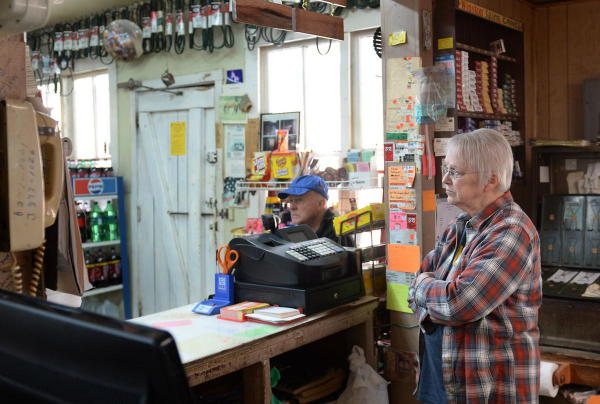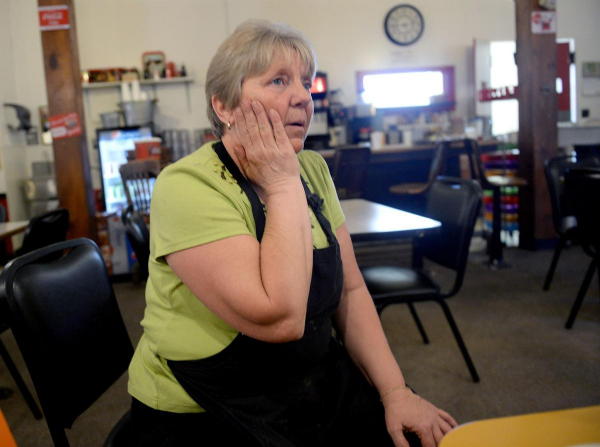TOPS IN UNEMPLOYMENT RATE, CALHOUN COUNTY LOOKS TO STEP FORWARD

Barbara Lynch, owner of Chloe Auto and Hardware in Calhoun County, and local resident Ralph Bowles spend time in Lynch's Orma store. The store offers supplies related to gardening, animal feed and plumbing, in addition to typical goods found in convenience stores. Photos by Chris Dorst
By Max Garland Staff writer for www.wvgazettemail.com
GRANTSVILLE â Just a few hundred yards away from Calhoun County's border with Ritchie County is the site of an under-construction compressor station for TransCanada's Mountaineer XPress pipeline.
Officials in Calhoun â where around 7,500 people live â anticipate the $94 million White Oak Compressor Station will breathe some life into the county's tight budget via taxes. The construction jobs the station and surrounding pipeline development offer are also welcome, but County Commissioner Chip Westfall acknowledges the work won't last forever.

Construction is beginning at the site of the White Oak Compressor Station in Calhoun County. A limited number of employees will be necessary to operate the station after its construction, but Calhoun County Commissioner Chip Westfall said the project will lead to much more tax revenue for the cash-strapped county.
"They are so automated now, they don't need a lot of people," Westfall said of compressor stations once they're built. "The real thing for us is the property taxes they are going to pay on it."
Steady employment options throughout the year remain a challenge for the rural county. Calhoun County has a 14.9 percent unemployment rate, according to WorkForce West Virginia's most recent data. That's currently the highest rate in the state, just like Calhoun had a year ago at 15.5 percent. The statewide unemployment rate now sits at 6.4 percent.
"[Calhoun] has historically been a distressed county with a high unemployment rate," said Fred Rader, community development director of the Mid-Ohio Valley Regional Council, noting Calhoun's lack of flat land posing trouble for developers.
The summer months are more forgiving for Calhoun â it had an unemployment rate of 7.1 percent last July â as construction and other weather-dependent jobs ramp up. Much of the work during construction season is likely outside the county, Rader noted.
"We have so many seasonal workers, and the people who work are mainly pipeline workers," Westfall said. "They don't work during the winter, so our unemployment rate goes up in the winter time. It should be dropping drastically now, and they'll get back to work."
Diane Ludwig, director of the Little Kanawha Area Development Corporation, which covers Calhoun, said the county economy is looking "cautiously better," pointing to the compressor station and related pipeline developments. Calhoun and surrounding counties are likely looking at 18- to 24-month boost from that, she said.
"The oil and gas industry, we ebb and flow with them," she said.
Regarding the unemployment rate, Ludwig said it's not a statistic to rely on. The sparse population means the rate can fluctuate wildly even with just a few people gaining or losing a job, she said.
"I understand that it's a thing to look at," Ludwig said. "I don't think it gives you an accurate picture."
Ludwig said Calhoun remains reliant on Minnie Hamilton Health System in Grantsville ("absolutely essential," she said) and the county school system to sustain jobs. Other vital employers in the region closing, like the BF Goodrich plant years ago, have made it hard to retain young talent.
"I was born and raised here, I am thankful for that, but it all keeps going down here because our young people are being educated and moving on, or they don't want to work," said retiree Edward Cain, who used to run local contractor Little Kanawha Excavating.
Little of the Mountaineer XPress Pipeline will be in Calhoun, but county jobseekers could latch on to construction work being done in nearby counties. After construction settles down, the White Oak Compressor Station will get its chance to shine, Westfall said.
"It's actually going to increase our county government operating budget by about 40 percent," Westfall said. "We have a lot of needs and a lot of places it can be put into."
That's a change the financially strapped county government â which Westfall said is the "most efficient" he knows of â is welcome to see. Rader said the county has "been so strapped for money for so long" that it could go a number of different ways with the additional tax revenue.
"It's really a matter of just catching up with what others are doing," Rader said.
In the meantime, there are local entrepreneurs making an economic difference in Calhoun, Ludwig said. But that's not an easy path to travel.
"If you start a business here, you know you're up against it," she said. "You know it's going to be hard."

Lisa Cooper, owner of Mom's Place Too Restaurant in Grantsville, knows her market and caters her menu to it. "I refer to this as a retirement town â my customers are mainly retired people," Cooper said. "I cook according to that. My specials are beans, cornbread, stuff older people like."
One key to survival is knowing the market, like Mom's Place Too owner Lisa Cooper does.
"I refer to this as retirement town â my customers are mainly retired people," said Cooper, whose restaurant is in Grantsville, Calhoun's county seat. "I cook according to that. My specials are beans, cornbread, stuff older people like."
Cooper has six employees, but notes she has gone through "a lot of people," many younger in age, unwilling to embrace "an honest way of living."
About 18 miles south in Orma, Barbara Lynch greets passersby at Chloe Auto and Hardware, which she has owned for about 18 years. The local business offers supplies related to gardening, animal feed and plumbing, in addition to typical goods found in convenience stores.
"We're like a little mini-Walmart," Lynch said. "We're here to get you out of a bind."
Job availability in the county has "slowed down," she said, and local shops face an uphill battle to stay stocked at reasonable prices. Wholesalers are having a harder time being convinced to supply rural shops as big box stores continue to absorb more of the marketplace, she added.
Supply struggles hit the Grantsville Foodland hard in the fall of 2016. At the time, store owner Facemire Foods pointed to economic struggles hurting sales and preventing the store from keeping its shelves full, along with Walmart and Kroger stores proving to be tough competition.
That's a challenge businesses in aging, rural communities frequently face â one that statistics can't provide a complete picture of, Ludwig said.
"When I see people going into empty storefronts and putting things in, when I see more traffic, when I see more people at a restaurant, that's more viable to me," she said. "But I know that's hard to measure."